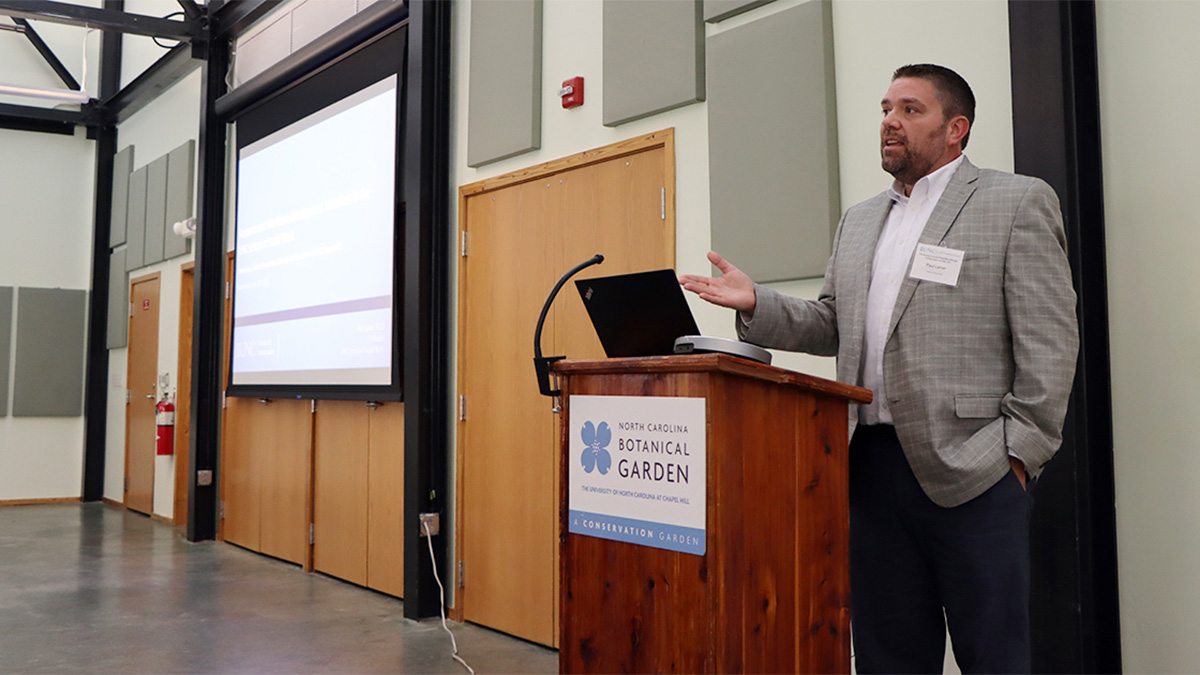Suicide experts convene to share information
An event put on by the UNC School of Medicine’s Suicide Prevention Institute brought together statewide researchers.
By Matthew Smith, UNC School of Social Work, Friday, February 9th, 2024

The following story discusses suicide, mental health and mental health resources. If you or someone you know needs mental health resources and support, call or text 988 or chat at 988Lifeline.org.
Several researchers at UNC-Chapel Hill focus on suicide-related intervention research, but linking their work across schools and departments can be daunting.
Bringing experts together was the goal of the UNC School of Medicine’s “Advancing Suicide Prevention Through Collaboration at UNC-Chapel Hill” event in November 2023, as faculty members and researchers came together to share their efforts on suicide prevention.
Hosted by the psychiatry department’s Suicide Prevention Institute, the event sought to break down barriers to collaboration and help researchers connect, share and “be curious.”
“We found that a lot of people at UNC were doing really interesting and important work on suicide, but they did not know that the group next door was doing something important that connected with them,” said Dr. Patrick Sullivan, Yeargan Distinguished Professor of Psychiatry and Genetics and director of the institute.
The country’s suicide rate hit its highest mark since 1941 last year, rising 35% over the last two decades. College students are reporting rising rates of anxiety and depression, so figuring out the best and most effective ways to intervene before, during and after a suicide attempt is vital work.
“Each of us knows someone that has been impacted by the tragedy and trauma of suicide,” then-Chancellor Kevin M. Guskiewicz said at the conference. “The teamwork embodies Carolina’s culture of collaboration. That’s how we solve the greatest challenges of our times. I’m confident that you’ll rise to this challenge.”
Work across campus
In all, the event included seven feature presentations and more than a dozen five-minute “lightning talks” by Carolina faculty, state workers and colleagues from UNC System institutions.
Carolina presenters included:
- Brian Pence, epidemiology department, discussed a project to establish a suicide surveillance system in North Carolina and using it to identify intervention points for suicide prevention.
- Avery Cook, Campus Health, highlighted the resources offered campuswide through the Heels Care Network, including mental health training, peer support and care referrals.
- Danielle Roubinov, psychiatry department, discussed efforts to provide pediatric mental health interventions while partnering with primary care providers to treat youth before early adulthood.
- Paul Lanier, School of Social Work, highlighted the many programs, hubs and centers focusing on behavioral health research and workforce development at the school, including the Youth Mental Health Systems Science Hub, Behavioral Health Workforce Research Center, Behavioral Health Springboard, UNC PrimeCare and Inclusive TEAMS.
Earlier this year, the state announced an $835 million investment in behavioral health with a plan to increase funding for services for mental health, substance abuse, youth mental health and strengthening the behavioral health workforce.
“There’s also a sense of urgency; things are very troubling in terms of the issues and data we’re seeing,” Lanier said. “I would also say that in North Carolina we have this amazing window of opportunity — a once-in-a-generation situation here right now — to really make some major changes. It’s exciting to be a part of that.”
Receiving support
In 2022, the Suicide Prevention Institute was announced as part of a $25 million commitment from William and Dana Starling.
Its long-term mission is to provide accessible alternatives to every person in North Carolina who is contemplating suicide while doing its best to ensure that no more families lose a loved one to suicide.
Students, faculty and staff seeking mental health resources can find them through Campus Health’s Heels Care Network. The network provides mental health and well-being resources, including links to 24/7 support, training opportunities and suicide prevention resources.


